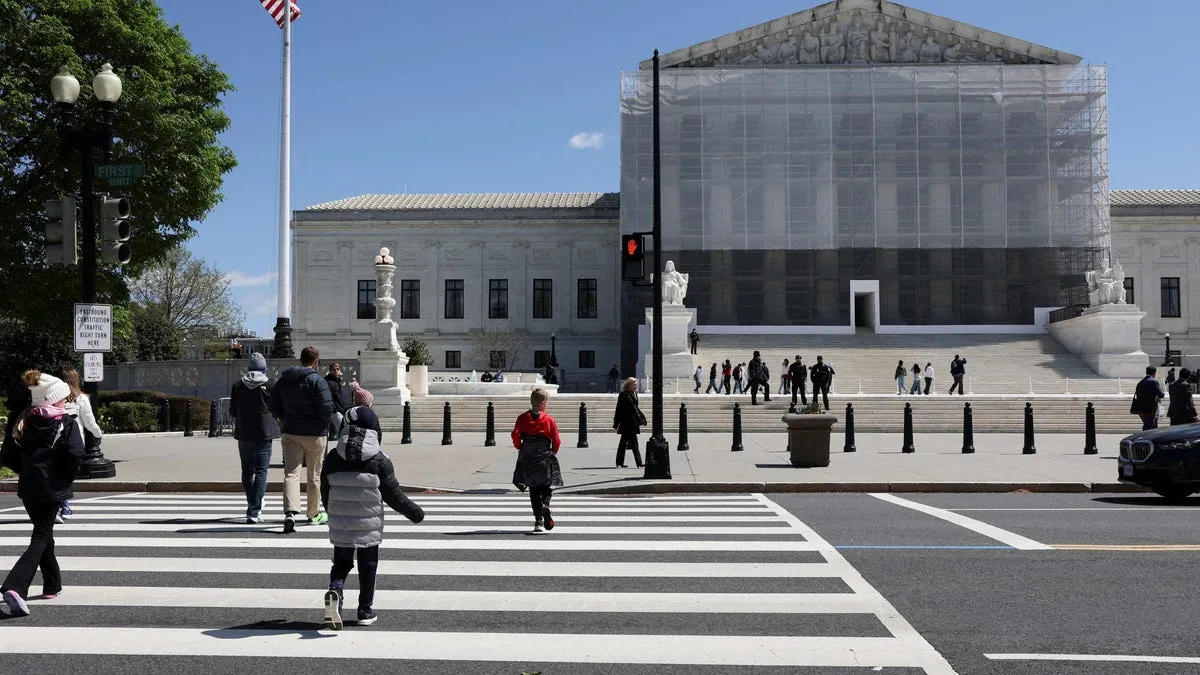
On April 19, 2023, the U.S. Supreme Court issued a significant ruling, temporarily halting the deportation of Venezuelan men currently in immigration custody. This decision came after their legal representatives alerted the justices that these individuals faced imminent removal without the necessary judicial review that the Supreme Court had previously mandated. The justices, in a brief and unsigned decision, instructed the government not to deport any member of the affected group until further notice.
The urgency of this situation was underscored by the American Civil Liberties Union (ACLU), which filed emergency petitions in multiple courts, including the Supreme Court, on Friday. Their actions were prompted by reports that some detainees had already been loaded onto buses, anticipating deportation. The ACLU raised concerns that the Trump administration was preparing to utilize a 1798 law, traditionally invoked during wartime, to expedite the deportation process without providing detainees an adequate chance to contest their removal, contrary to Supreme Court requirements.
As the ruling unfolded, the White House did not immediately respond to requests for comments regarding the Supreme Court's decision. This case highlights critical questions about the Trump administration's compliance with the legal boundaries set by the Supreme Court, raising the potential for a serious conflict between the legislative and executive branches of the U.S. government.
President Trump, who was elected on a platform emphasizing strict immigration enforcement, invoked the 1798 Alien Enemies Act to facilitate the rapid deportation of alleged members of Tren de Aragua, a criminal organization originating from Venezuelan prisons, which his administration has labeled a terrorist group. This situation has sparked a debate about the extent of executive power in immigration matters and the implications for the separation of powers in the U.S.
During a related court hearing on Friday, a government attorney stated that there were no immediate plans by the Department of Homeland Security to proceed with the deportations that day, although deportations could occur on Saturday. The ACLU had requested that any deportations be blocked by the courts, but Judge James Boasberg denied this request, referencing a recent Supreme Court ruling that allowed the use of the Alien Enemies Act under specific conditions.
Trump's administration faced a setback when Judge Boasberg expressed concern over potential deportations occurring as early as Saturday. Following a previous adverse ruling, Trump had called for Boasberg's impeachment, leading to a rare public admonishment from Chief Justice John Roberts.
While one legal battle unfolded in Judge Boasberg’s court, the ACLU pursued a separate strategy to prevent the deportation of Venezuelan detainees in Texas. They filed with the Supreme Court after failing to secure a quick response from other courts regarding the deportations. The Supreme Court's order invited the Trump administration to respond to the ACLU's urgent request after the Fifth Circuit Court of Appeals made its decision.
Central to this case is whether the Trump administration has adhered to the Supreme Court's standards for ensuring due process for detainees prior to their removal from the country. This process is crucial, particularly given the possibility of deportation to El Salvador, where conditions in prisons are notoriously harsh.
The potential deportation of these individuals marks the first significant action following the Supreme Court's recent ruling that allowed removals under the 1798 law. However, the Court specified that detainees must receive adequate notice, allowing them the opportunity to seek habeas corpus relief—a fundamental right under U.S. law that permits individuals to contest the legality of their detention. There remains uncertainty regarding how much notice will be provided to the detainees, with legal experts suggesting that a 30-day notice period would be reasonable.
Despite the lack of clarity from the Trump administration about the notice period, the ACLU presented evidence in court, including a photograph of a notice received by one of the detainees, indicating that he had been classified as an "Alien Enemy" subject to removal. The notice was partially obscured, and it was noted that the individual had refused to sign it.
When questioned about the deportations, Trump claimed he was not familiar with the specifics of the case, but asserted that if these individuals were indeed criminals, he would support their deportation. This sentiment reflects the administration's stance on immigration enforcement, which has been a contentious issue in U.S. politics. Meanwhile, defense attorneys and Democratic lawmakers have demanded transparency from the administration regarding the evidence used to classify these Venezuelans as gang members, especially given Tren de Aragua's involvement in serious crimes in South America.
In a statement on Friday, Assistant Secretary for U.S. Homeland Security, Tricia McLaughlin, emphasized the administration's commitment to complying with the Supreme Court's ruling while maintaining the confidentiality of counter-terrorism operations.
The legal and political ramifications of this case are profound, as the Trump administration seeks to advance its immigration policies while potentially challenging the constitutional limits of executive power. As developments unfold, the situation remains a focal point of national debate surrounding immigration law and the rights of detainees in the United States.